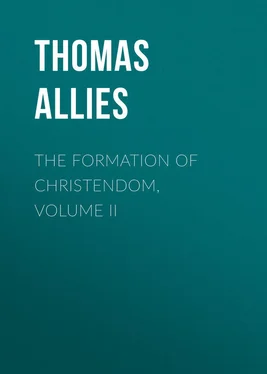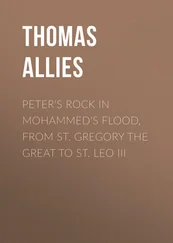Thomas Allies - The Formation of Christendom, Volume II
Здесь есть возможность читать онлайн «Thomas Allies - The Formation of Christendom, Volume II» — ознакомительный отрывок электронной книги совершенно бесплатно, а после прочтения отрывка купить полную версию. В некоторых случаях можно слушать аудио, скачать через торрент в формате fb2 и присутствует краткое содержание. Жанр: foreign_antique, foreign_prose, на английском языке. Описание произведения, (предисловие) а так же отзывы посетителей доступны на портале библиотеки ЛибКат.
- Название:The Formation of Christendom, Volume II
- Автор:
- Жанр:
- Год:неизвестен
- ISBN:нет данных
- Рейтинг книги:3 / 5. Голосов: 1
-
Избранное:Добавить в избранное
- Отзывы:
-
Ваша оценка:
- 60
- 1
- 2
- 3
- 4
- 5
The Formation of Christendom, Volume II: краткое содержание, описание и аннотация
Предлагаем к чтению аннотацию, описание, краткое содержание или предисловие (зависит от того, что написал сам автор книги «The Formation of Christendom, Volume II»). Если вы не нашли необходимую информацию о книге — напишите в комментариях, мы постараемся отыскать её.
The Formation of Christendom, Volume II — читать онлайн ознакомительный отрывок
Ниже представлен текст книги, разбитый по страницам. Система сохранения места последней прочитанной страницы, позволяет с удобством читать онлайн бесплатно книгу «The Formation of Christendom, Volume II», без необходимости каждый раз заново искать на чём Вы остановились. Поставьте закладку, и сможете в любой момент перейти на страницу, на которой закончили чтение.
Интервал:
Закладка:
We have thus contemplated four distinct pictures. The first of these was human nature bare and naked by itself, a merely ideal view of man, as a being compounded of soul and body, each possessing only the faculties which belong to them as spiritual and corporeal natures, the result of which is a substantial union, because the spiritual substance becomes the form of the corporeal, not by making the body, when already animated by another principle, to participate of spiritual life, but by becoming itself the principle first animating it. And we set forth this condition of human nature in order to throw light upon our second picture – the first man as he was actually created, possessing, as a gift superadded by the purest divine bounty to this his natural constitution, a divine sonship founded in grace; which transcendant union of the Holy Spirit with his soul kept the soul with all its faculties in a loving obedience to God, and the body in obedience to the soul; and added even to this state the further gratuitous prerogatives of immunity from error, fault, pain, distress, and death. Our third picture was man in this same state, but constituted besides by the divine will, whose good pleasure was the sole source of all this state of sonship, to be father of a race like to himself, receiving from him, with its natural generation, the transmitted gift of sonship; that is, from our view of him as an individual person we went on to consider him as the head of a body – the root of a tree. Fourthly, we have looked on the same man stripped by a fault, personal to himself but natural to his race, of this divine sonship – reduced to a state like that which the first would have been, but altered from it by two grave conditions, one of guilt lying on himself and his race on account of this gratuitous gift of sonship lost, another of captivity to that enemy of his Creator and Father who had seduced him to fall. And this picture included in it the double effect of guilt transmitted through a whole race from its head and father, and of the personal sins of each individual of the race: which, moreover, had a tendency to be perpetually heightened by the social nature of man – that part of his original condition which, as it would have supported his highest good in the state of innocence, so came to make his corruption intense and more complicated in the state of fall. It has not been our purpose in this sketch to dwell upon those who, like Adam himself after his fall, accepted the divine assistance offered to them, and the promise of a future Restorer, and who, living a life of penance, kept their faith in God. Such an assistance was offered not only to Adam but to his whole race, and such a line of men there always was; of whom Abel was the type in the world before the flood; Noah after the flood, as the second father of the whole race; Abraham, the friend of God and father of the faithful, in whose son Isaac a people was to be formed, which, as the nations in their apostasy fell more and more away from the faith and knowledge of the true God, should maintain still the seed of promise out of which the Restorer should spring. But before that Restorer came, the heathenism – of which we have been speaking in the former chapter, and of which we have been giving the solution above – was in possession of all but the whole earth, and the captivity of man to his spiritual foe, on account of which that foe is called “the Ruler” and “the God” “of this world,” which is said “to lie in the malignant one,” 56 56 The apostle speaks here not of “wickedness,” but of a personal agent, “the wicked or malignant one;” as the context shows. “He who is born of God keeps himself, and the malignant one touches him not. We know that we are of God, and the whole world lies in the malignant one.” 1 John v. 18, 19.
was all but universal. This universality denoted that the fulness of the time 57 57 Gal. iv. 4. τὸ πλήρωμα τοῦ χρόνου.
marked out in the providence of God was come.
For Adam, in his first creation, and in the splendour of that robe of sonship 58 58 τύπος τοῦ μέλλοντος. Rom. v. 14. “Forma futuri e contrario Christus ostenditur.” S. Aug. tom. x. 1335.
in which he was invested, had been the figure of One to come: his figure as an individual person, his figure as father and head of a race; his figure likewise, when the race itself is viewed as summed up in one, as one body. Let us take each of these in their order.
What was the counterpart of Adam, as an individual person, in the new creation? It was the Eternal Son Himself assuming a human soul and body, and bearing our nature in His divine personality. Over against the creature invested with sonship stood the uncreated Son, invested with a created nature. For the grace of the Holy Spirit given by measure, and depending for its continuance on the obedience of the creature, was the Fountain of Grace Himself ruling the creature by a union indefeasible and eternal; for grace communicated grace immanent in its source. For the son gratuitously adopted was the Son by nature, making, by an inconceivable grace, the created nature assumed to be that not of the adopted but of the natural Son. In a word, the figure was man united to God; the counterpart, the God-man.
What, again, is Adam's counterpart as Father and Head of his race? It was human nature itself, which the Word of God espoused in the bridal chamber of the Virginal Womb, and so is become the Second Adam, the Father of a new race, the Head of a mystical Body, which corresponds to Adam's original Headship, but as far transcends it as the grace of the Incarnate Word transcends the grace bestowed on the first man. As Adam, had he stood in his original state of son, would have transmitted the gift of a like sonship to his whole race – as, falling, he did actually transmit to that race the guilt of adoption lost, so the Second Adam, out of His own uncreated Sonship, but through the nature which He had assumed, bestowed the dower of adopted sons and the gift of justice on his race. From the one there was punishment generating through the flesh; 59 59 “Adam unus est, in quo omnes peccaverunt, quia non solum ejus imitatio peccatores facit, sed per carnem generans pœna: Christus unus est, in quo omnes justificentur, quia non solum ejus imitatio justos facit, sed per spiritum regenerans gratia.” S. Aug. tom. x. p. 12 c.
from the other, grace regenerating through the Spirit. From the one, nature stripped and wounded, yet still bound to its head by an indissoluble tie; by the other, the Spirit of the Head, the Spirit of Truth, Charity, Unity, and Sanctity, ruling his Body and animating it, as the natural soul animates the natural body. Precisely where the mystery was darkest and the misery greatest, the divine grace is most conspicuous, and the divine power most triumphant. The very point which brings out Adam's connection with his race has an exact counterpart in Christ's Headship of His people, and an inscrutable judgment serves to illustrate an unspeakable gift. In exact accordance with the doctrine that the sin of Adam is man's sin, and the guilt of Adam man's guilt, is that boundless and unimaginable grace that the Incarnate Word did not merely assume an individual human nature, but espoused in that assumption the whole nature; that on the cross He paid the debt of the whole nature, whether for original or actual sin; that His resurrection is our collective justification; that the gift of sonship is bestowed on men not as individual persons, but as members of His Body, before they have personally merited anything, just as the guilt came on them, as members of Adam, before they demerited anything personally. Exactly where the obscurity of the fall was the deepest, the light of the restoration is brightest; and where the sentence was most severe, the grace most wonderful. But to deny the first Adam would entail the loss of the Second; and he who declines the inheritance of the father stripped and wounded cannot enter into the Body of the Word made flesh.
Интервал:
Закладка:
Похожие книги на «The Formation of Christendom, Volume II»
Представляем Вашему вниманию похожие книги на «The Formation of Christendom, Volume II» списком для выбора. Мы отобрали схожую по названию и смыслу литературу в надежде предоставить читателям больше вариантов отыскать новые, интересные, ещё непрочитанные произведения.
Обсуждение, отзывы о книге «The Formation of Christendom, Volume II» и просто собственные мнения читателей. Оставьте ваши комментарии, напишите, что Вы думаете о произведении, его смысле или главных героях. Укажите что конкретно понравилось, а что нет, и почему Вы так считаете.












